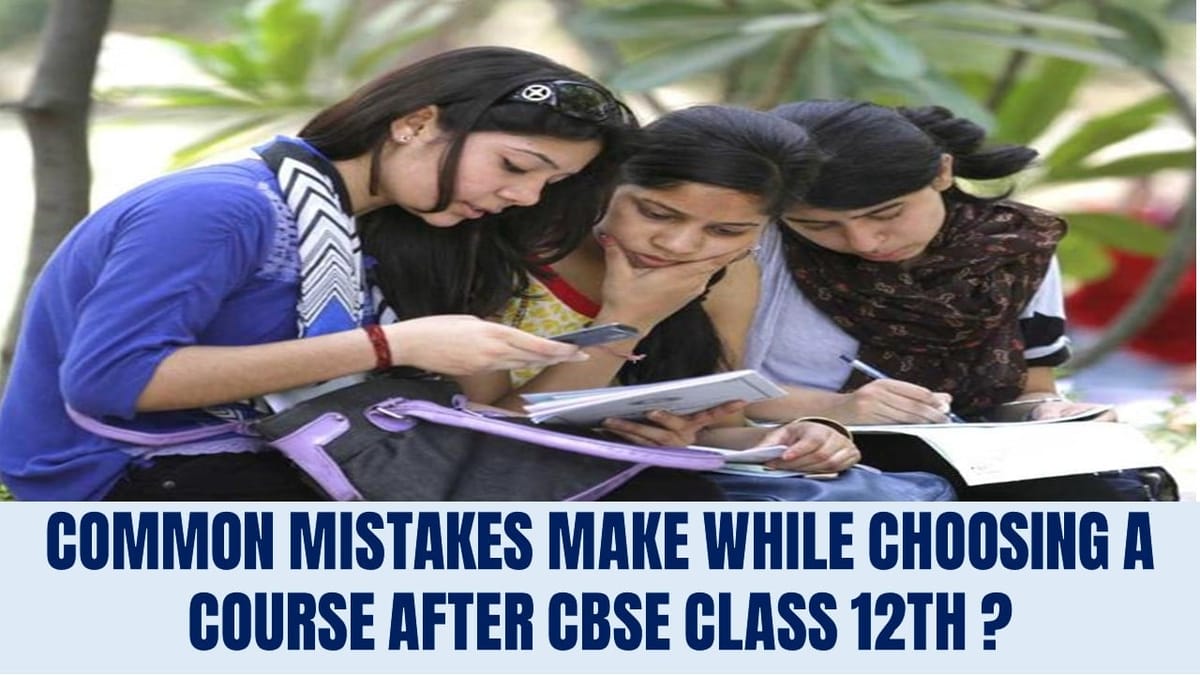Choosing the proper course after class 12 is an important decision for students because it affects their academic future and professional route.
Shubhra Goswamy | Jun 5, 2024 |

Mistake After CBSE Class 12th: What mistakes students do while choosing a course after CBSE Class 12th?
After completing their 12th grade education, students must make a critical decision that will have a lasting effect on their future: their career route. It can be a difficult and demanding undertaking, and many students frequently make mistakes when doing it. In this post, we’ll examine several typical errors made by students when deciding on a career after high school and offer helpful advice on how to prevent them.
Neglecting One’s Own Passions and Interests
Ignoring personal interests and passions when selecting a job route is one of the most frequent mistakes made by students. A lot of students follow careers that are not in line with their genuine inclinations because of outside influences or social expectations. To guarantee a happy and rewarding career, students must reflect on their lives and determine their interests.
Peer pressure’s impact
Peer pressure has a big influence on how students make decisions. Even if a career doesn’t fit with their interests or skills, students frequently feel pressured to pursue the path that their friends or peers are taking. Students must always keep in mind that every person’s journey is different and that they should concentrate on their own goals and strengths.
Expectations from Parents
Parents have a big influence on a student’s profession choice, and occasionally their expectations can take precedence over the student’s preferences. To improve understanding and support, students should have candid discussions about their professional goals with their parents.
Neglecting Skill and Ability
One more frequent error that students make is to disregard their aptitude and talents. Different skills and aptitudes are possessed by each person, and success and fulfilment can result from matching these with an appropriate job path.
Relying Solely on Market Trends
It can be dangerous to just follow market trends at face value. While understanding the employment market is crucial, making a career decision based only on prevailing trends may ultimately leave one disappointed. The demands of the job market and students’ interests should be balanced.
Planning and research are undervalued
Students who don’t do enough planning and research may find it difficult to make well-informed decisions. Making better decisions might result from doing extensive research on various job opportunities and from developing a well-structured plan.
Disregarding Prospective Employment
Focusing too much on one’s immediate career prospects can be a mistake. Students must to think about the prospects for growth and advancement along their chosen career path as well as its future possibilities.
Going After a Career in Prestige or Money
Burnout and unhappiness can result from selecting a vocation purely for financial gain or reputation at the expense of one’s own passion and interest. Finding a balance between one’s personal fulfilment and professional opportunities is essential.
Insufficient direction and therapy
When making decisions, students may feel lost and confused if they receive inadequate assistance and counselling. Consulting with specialists and career counsellors might yield insightful information and guidance.
Observing the Crowd
Without considering their own preferences, many students choose careers that are popular. Instead of going with the flow, it’s critical to make a personalized choice.
Considering Internships to be Unimportant
Exposure to potential job fields and hands-on experience are provided by internships. A lack of practical knowledge may arise from undervaluing internships.
Neglecting Alternative Career Paths
Unconventional job routes that would better suit their interests and skills are sometimes disregarded by students. Making unique and fulfilling professional decisions might result from investigating a variety of opportunities.
Selected Career for Immediate Objectives
It can be difficult for pupils to see the wider picture when they are just focused on short-term objectives. Long-term job goals and how they fit with personal beliefs should be taken into consideration by students.
Disregarding Individual Principles
Feelings of emptiness and discontent might result from choosing a career that disregards personal beliefs. It is critical that students evaluate how well their chosen vocation fits with their moral and ethical principles.
Reluctance to Ask for Assistance
There are Students who are reluctant to ask professors, mentors, or other experts for assistance and advice. Accepting help might open their eyes and give them insightful information.
Conclusion
An important turning point in a student’s life is deciding on a career after the 12th grade. A good career can be attained by avoiding frequent blunders. Students may make well-informed decisions that support their goals and pave the way for a successful future by taking into account their unique interests, abilities, and passions, getting advice, and doing extensive research.
In case of any Doubt regarding Membership you can mail us at [email protected]
Join Studycafe's WhatsApp Group or Telegram Channel for Latest Updates on Government Job, Sarkari Naukri, Private Jobs, Income Tax, GST, Companies Act, Judgements and CA, CS, ICWA, and MUCH MORE!"